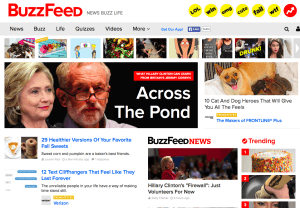5 Reasons Buzzfeed is a Digital Winner. Plus, an AMAZING cat video.

From 'listicles' and cat videos, Buzzfeed is now moving into coverage of conflict, disaster and global politics. Is 'social' the future of news?
Buzzfeed has taken the ‘news’ world by storm with a unique approach which invokes criticism from legacy media players, but succesfully challenges many of the basic notions of how news organisations can function. Cat videos help drive audience for sure, but there is much more to this story.

The fundamental concept behind Buzzfeed is ‘social’ news. Every article is commissioned and written with the intention that it gets shared, or becomes viral. This is described by The Motley Fool here:
“BuzzFeed founder and CEO Jonah Peretti has described the company’s goal as becoming ‘the defining media company for the social age,’ a phrase notably front and center in the press releases of its investors. BuzzFeed’s redefining of how the business of media gets done would seem to be more about leading publishers into more effective ways of monetizing their businesses than it is about content.”
Critics says that in fact the business model is not about content at all, rather about capturing revenue on each article.
Ben Thompson in Stratechery.com writes in “Why Buzzfeed is the Most Important News Organization in the World” that the basics of the news business model are undermined by the internet and that Buzzfeed is capitalising on the new dynamics. For example, unlike a newspaper there are no limits to the amount of content Buzzfeed publishes, and unlike the traditional locally based mastheads it is essentially a ‘global’ brand. Perhaps most importantly it accepts that the audience is the arbiter of what is newsworthy, removing the guardianship traditional journalists have over what is published and where. If the community of readers deems the article interesting or important it will be shared. If it fails to meet those tests, it will not.
Thompson says the company has developed a sophisticated understanding of its audience and is now capitalising on this. He explains where Buzzfeed captures revenue:
“What’s especially exciting about BuzzFeed, though, is how it uses that knowledge to make money. The company sells its ability to grok – and shape – what works on social to brands; what they don’t do is sell ads directly. By ads I mean the sort of display ads you see on just about every other publishing site; your typical BuzzFeed page will have links to stories they have created for brands for pay”.
The criticism is that in doing this Buzzfeed has blurred the line between editorial & sales, building sponsored content into its feed of news. Additionally, it has been tarnished with the ‘click bait’ mantle, articles designed specifically to produce clicks.
To counter this Buzzfeed’s Editor Ben Smith argues:
“BuzzFeed has never sold a banner, and I couldn’t even tell you how many monthly page views we get. And so our business model at least moderates that incentive to drag every last click out of our audience.”
The benefit of this says Thompson is that “by not making money from display ads, and by extension deprioritizing page views, BuzzFeed incentivizes its writers to fully embrace Internet assumptions, and just as importantly disincentivizes pure sensationalism.”
There is much to debate about the business model, in particular the point at which Buzzfeed captures revenue and the impact this has on the editorial process, but the reality is the formula is working. Buzzfeed is starting to invest in serious public interest journalism, or ‘content’ as we might now call it. They are aggressively recruiting investigative journalists and building a network of foreign correspondents globally. They don’t rival the major players yet, but they are doing a lot with a little. This is the primary reason Buzzfeed is one organisation everyone in the industry is watching.
And now that you’ve made it through this blog-post, here’s a cat video for your viewing pleasure!
https://www.youtube.com/watch?v=PwDcfjMIvLw



Buzzfeed’s business model of inserting paid links into their articles worries me for two reasons. First, just like Uber’s most valuable asset is their drivers, Buzzfeed’s most valuable asset is their community. They rely on “shares”, “likes”, and all things social media to spread their articles and capture value. That being said, readers could be turned off by Buzzfeed’s tactics and move on to a new source once they understand how it works. Second, Buzzfeed’s end goal to create value by becoming a serious content provider seems hypocritical given its current pop-culture reputation. If anything, I think this move will destroy value within their current user base. They should keep focusing on the ridiculous and light-hearted, because everyone needs a cat video in their life at some point.
A fair point, but wouldn’t you concede that traditional news players are doing much the same anyway? The big traditional players in the market are also including similar paid content within their pages & broadcasts. Additionally, network news broadcasts & serious broadsheet mastheads are all now engaged in the “pop-news” & click-bait content business too. Watch any evening news broadcast and it’ll likely include some viral content, not to mention the breakfast television broadcasts which devote daily scheduled air-time.
It might “seem hypocritical” for Buzzfeed to enter the serious end of the content market at the outset, but the reality is Buzzfeed is making significant inroads with high-calibre correspondents covering major world events. When I covered last year’s war on Gaza for a major brand market player I found myself competing against a journalist from Buzzfeed, who did extraordinary work. Her work received both acclaim and audience traffic. The cat-video history of her platform seemed to mean very little.
I’m a big fan of BuzzFeed but view it more as a way to kill time and stay up to date on what’s trending in social media as opposed to a legitimate source of news. I agree that its business model to date has been successful, but I really question whether BuzzFeed will be able to successfully cross the chasm and create serious public interest journalism or “content.” It seems as though BuzzFeed caters to a particular audience of young, tech-savvy individuals and probably isn’t entirely relevant to older (or more serious) consumers of news. I’d be curious to see the demographic breakdown of BuzzFeed readers vs. that of the New York Times or other more reputable news outlets.
You’re right that Buzzfeed isn’t known for its journalistic prowess. But that could be changing. In the last two years it’s grown an investigative reporting team that’s gone after some big stories. They often focus on issues important to young people, but those can often be pretty serious. One example is Ellie Hall’s work on the American teenagers who have been recruited by ISIS: http://www.buzzfeed.com/ellievhall/gone-girl-an-interview-with-an-american-in-isis#.jgXMJxOBP
This article reminded me of a piece I read about Snapchat’s massive growth. Both companies started as niche players, targeting a specific group of people. Snapchat for questionable photos, and buzzfeed for highly social content. Snapchat has now become a source of city information with their “stories” feature, and have expanded their regular chat capability. Buzzfeed has also increased their offering as their user base grew. It’s interesting to see the parallels of companies which start narrow and need to expand in order to monetize their network. As an entrepreneur we can learn from these companies and predict some of the challenges we will face if we follow this same model.
Great post! I’d love to hear what you think about Comcast’s $200M investment in Buzzfeed and $200M investment in Vox. Does this investment validate that social is the future of news? Do you think these companies are overvalued? And what implication does this deal have how on how other established news institutions will think about playing in the digital space in the future especially as it relates to native advertising?
Thanks for the feedback AJT.
Certainly the strategy being articulated by large broadcasters now is all about ‘social’. I’ve heard countless senior media execs in the past year say things like “it is all about sharing”, that is, we are no longer worried about driving audience to our own site. In my experience, focus shifted to getting content distributed as widely as possible. In this context, the view I heard repeated often is that Facebook is far superior to any other platform, particularly if your focus is video.
You can now see this trend in evidence at most major broadcasters, including the aforementioned investments in Buzzfeed & Vox. Furthermore major networks are now doing tie-ups with Facebook for live-events at Buckingham Palace, or with the Pope.
Thanks for the feedback AJT.
Certainly the strategy being articulated by large broadcasters now is all about ‘social’. I’ve heard countless senior media execs in the past year say things like “it is all about sharing”, that is, we are no longer worried about driving audience to our own site. In my experience, focus shifted to getting content distributed as widely as possible. In this context, the view I heard repeated often is that Facebook is far superior to any other platform, particularly if your focus is video.
You can now see this trend in evidence at most major broadcasters, including the aforementioned investments in Buzzfeed & Vox. Furthermore major networks are now doing tie-ups with Facebook for live-events at Buckingham Palace, or with the Pope.